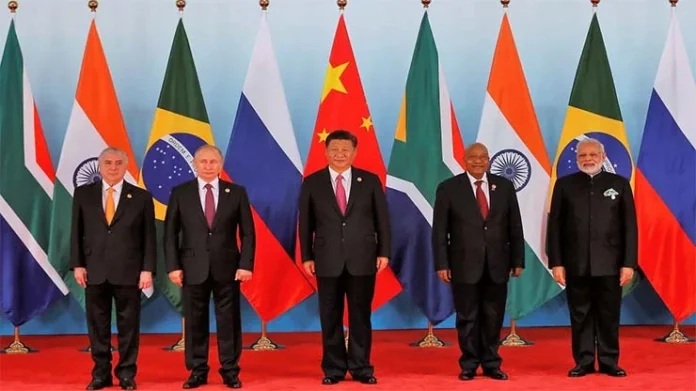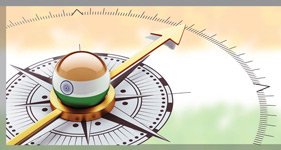Since achieving independence in 1947, India has come a long way from a post-colonial “Third World” country. As India celebrates 75 years of its independence, Indians can take pride in the monumental transformation the nation has made. It is no longer a country that perpetually struggled with economic and financial challenges. In global politics, India has made a mark by taking leadership role in important forums and on important issues. It is a military power and a responsible nuclear state. It has built strategic relationships with the important members of the global community and global and regional powers. India and United States (US) have built strong strategic relationship in the twenty-first century encompassing trade, business and economic ties, military, defence and strategic cooperation, political understanding and people-to-people contacts. At the same time, India’s strategic relationship with Russia has endured the test of time with the country remaining one of India’s most important allies and defence partners. Similarly, despite political differences and geopolitical competition, India has strong bilateral engagement with China in trade and economic domains, and has cooperated with it in multilateral forums including the United Nations (UN), the G20, and BRICS (Brazil, Russia, India, China and South Africa) and Shanghai Cooperation Organization (SCO).
India has also developed strategic relationships with multiple regional powers in different parts of the world. In East and Southeast Asia, Japan, South Korea, Singapore, Vietnam, Philippines, Indonesia and Malaysia have emerged as its pre-eminent economic and strategic partners. At the same time, India and Australia have developed their relations and cooperation across domains and areas, and have been working together through forums such as quadrilateral security dialogue (Quad) to ensure free and open Indo-Pacific. In West and Central Asia, India has developed partnerships with countries like Iran, Saudi Arabia, United Arab Emirates (UAE), Oman, Israel as well as Afghanistan, Uzbekistan and Kyrgyzstan. In its immediate neighbourhood, India’s relations with Bangladesh, Nepal, Sri Lanka, Bhutan and Myanmar can be defined as strategic relationships. Besides, India has developed strategic relationships in Africa and Latin America with Egypt, South Africa, Morocco, Kenya, Tanzania, Senegal, Brazil, Argentina, Mexico and others. In Europe, India’s strategic partners include countries across the Western and Eastern Europe including the United Kingdom (UK), France, Germany, Hungry, the Czech Republic and so on.
India has been able to achieve this by deftly navigating the domestic, regional and international challenges faced by it over the 75 years. At the international level, the challenge was to break the mould of a post-colonial state struggling with managing its internal affairs, and not able to develop equal relationship with world powers. India has been able to achieve this, and this was not easy as in global politics every decade and every century brings its own challenges, and the way the community of nations respond to these challenges defines the future, and brings its own sets of challenges. For example, the beginning of the twenty-first brought the scourge of global terrorism of the Islamist-jihadist variety to the fore after the Al-Qaeda attack in the US on 11 September 2001. The 9/11, as the event came to be known, redefined the threat from non-state actors, not only to the nations but for the global community. That a rugged non-state actor taking refuge in a conflict-ridden country can mount such an attack on the world’s strongest military power was a statement in itself. This obviously led to a sharp and scathing response from the US that attacked Afghanistan and Iraq and this led to many other problems that the US and the world had to endure. The advent of Arab Spring uprisings in 2010-11 and the outbreak of Covid-19 in 2019-20 brought to the fore newer challenges of autocratic regimes and health security, which the world has to endure.
Why it is important to recall these profound events is that these have defined the global politics in the twenty-first century, which is in a flux and going through a monumental phase of transition. The world is no longer bipolar, as it was during the most part of the twentieth century after the end of World War II, and was defined as the period of Cold War between the US and its transatlantic allies in Western Europe and United Soviet Socialist Republic (USSR) and its allied communist states in different parts of the world. Global politics has also passed through its brief unipolar moment that defined the world order in the post-Cold War period, and was most spectacularly manifested in the Gulf War when the US and its 35 partners waged a war against Iraq in response to its invasion and annexation of the tiny Gulf state of Kuwait. However, as noted above this unipolar moment was brief and ended symbolically by the 9/11 terrorist attack.
Just as any new decade or century brings its own challenges, it also brings opportunities and promises. In the twenty-first century, the world is defined as multipolar, wherein no single nation has the power, status or influence to determine the direction of global politics and set standards for global issues. There are multiple countries that have the ability to determine and impact the politics either at the global level or in their immediate region, and this has created opportunities and promises of cooperation but also the challenge of friction, competition and rivalries.
In the 75 years since its independence where does India stand in this global order? How has India been able to face the challenges thrown by global and regional developments? Have this made India stronger? What is the status of India in the global community? These are important questions, and as Indians we can take pride in the fact that the nation has come a long way from the time of its independence in all aspects of politics, society, and economy as well as in other domains. India today is recognised by the global community as an emerging global power, and obviously a country that is ready to play a stabilising role in multiple regional theatres beyond its immediate environs. The size of its demography and economy can no longer be ignored. Its location in the middle of Asia, occupying the norther landmass of the Indian Ocean, accords it a preeminent position in the global connectivity network. This is especially important as the twenty-first century is considered an Asian century.
A key aspect of the Asian century is the shifting of the global economic nerve centre to Asia, and along with China, Japan, South Korea, and the member states of Association of South East Asian Countries (ASEAN) and the energy-rich states in the Persian Gulf, India has emerged as one of the key economic growth stories. The size of its economy has swelled to US$3.5 trillion as of 2022 and it aspires to become a US$5 trillion economy in the coming years. India is a global information technology (IT) giant and it has one of the world’s largest militaries. It is the world’s largest democracy and has millennia of civilisational heritage that accords it unique distinctions in the community of nations. The size of its economy and the untapped potentials in it makes it one of the most attractive destinations for the global entrepreneurs and corporations. At the same time, Indians have been making their names for their entrepreneurial skills and business acumen all over the world. Besides Indian business are growing and spreading their wings and horizons to reach out to uncharted territories.This has made India one of the most attractive countries for the world, and helped India expand its strategic relationships with different regions and countries. From East to West, Asia to Europe, Africa to Americas, India has built strategic partnerships, and this has made India a global actor with status and influence beyond its immediate environs.
But as noted above, every decade brings its own challenges and opportunities. As India celebrates 75 years of its independence, challenges remain and there are new opportunities to be grabbed. These emanate from Indian domestic, regional as well as the global environment. At the global level, India’s emergence as a major power bodes well for international politics. It can play the role of a global power that can bring stability, and its ideational convictions of diplomacy and peace to global politics.
The world politics is witnessing major challenges, especially the rise of an aggressive China is a concern for India and the global community. China is an important member of the global community, and has the right to develop and grow in a peaceful manner, but its conduct in its immediate environs in the South China Sea, and in the Indian Ocean has attracted international attention for its destabilising consequences. India, on the other hand, is seen as a stabilising force, both in multiple regions as well as in international politics.
As India celebrates the 75 years of independence, it is important to rejoice in our achievements and reflect on our failures and learn from them. It is important at this juncture to assess the strategic relationships the nation has built and decide the new priorities in these relationships. India at 75 is a young nation and there is a lot to be learnt and achieved, and it is important for that to continue expanding our strategic relationships with existing partners and search for new partners who share India’s vision of progress and growth.
-The author is a fellow at Manohar Parrikar Institute for Defence Studies and Analyses, New Delhi. Views expressed are personal and do not necessarily reflect the views of MP-IDSA or Government of India. Twitter: @MuddassirQuamar
–The author is an Associate Professor of Middle East Studies at Jawaharlal Nehru University, New Delhi. The views expressed are personal and do not necessarily reflect the views of Raksha Anirveda













